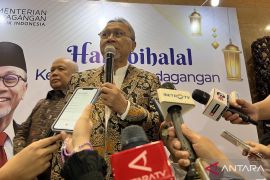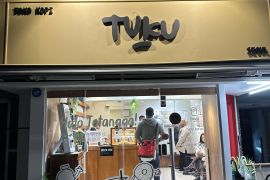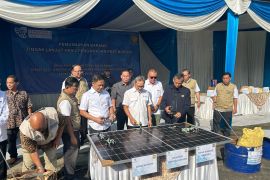Even as its trade growth with Europe declines this year, Indonesia is convinced that the year 2012 would lay down the basis for boosting trade with the region next year and in the future.
There have been positive indicators from a number of European markets such as the Netherlands, Germany, Nordic states and Eastern Europe, where Indonesia`s exports will normalize in the future, Trade Minister Gita Wirjawan said.
He added that if the global crisis had not hit countries in Europe, Indonesia would have been able to increase its trade with these countries by about 5 percent to 10 percent. "But due to the economic crisis, trade between Indonesia and the European Union was only expected to grow by about zero to one percent," the minister said, while inaugurating the EU-Indonesia Business Dialogue (EIBD) in Nusa Dua in Bali on Thursday.
However, the minister expressed optimism after seeing Indonesia`s trade performance in the region in 2011.
Indonesia`s success in its trade with the European Union in 2011 was one of the reasons for the country to feel optimistic. Indonesia recorded a bilateral trade value of US$33 billion in 2011 with the European Union.
The figure reflected that Indonesia`s trade with the European Union increased by 22 percent, compared with that in the previous year. With that figure, Indonesia also enjoyed a surplus of US$8 billion.
The surplus could create more jobs in Indonesia and would help the country maintain its balance of payments.
According to the minister, Indonesia would continue to build communications and establish cooperation in order to boost and maintain future trade growth with the European Union.
"I hope the EIBD meeting will help formulate points of good cooperation, which would benefit not only us but also other regions," the minister said.
He added that the business dialogue would also aim at formulating issues not only in the field of trade, but also in the investment, tourism, creative economy and creative building. "The capacity building is expected to help find ways that will build better human resources and generate a transfer of technology," the minister said.
Through cooperation with European countries, Indonesia`s trade was expected to increase.
Cooperation with Britain for example, was expected to help double trade between the two countries by 2015.
According to Coordinating Minister for Economic Affairs Hatta Rajasa, Indonesia hoped that its trade with Britain would double by 2015 through enhanced bilateral ties. "The two countries` bilateral trade value has reached US$3 billion. We hope to double it by 2015," he said.
President Susilo Bambang Yudhoyono`s visit to Britain recently was also expected to help augment investment and trade relations between the two nations. "We seek increased cooperation in trade and investment, particularly in energy and manufacturing, because Britain is technologically very advanced in these sectors," Hatta stated.
Before leaving for London last week, President Yudhoyono had said that Indonesia and Britain would focus on cooperation in the fields of trade and investment, education, environment, democracy, and religion.
The same idea was also expressed by trade minister Gita Wirjawan. Gita Wirjawan and his British counterpart Stephen Green have agreed to increase their countries' wo-way trade to US$6 billion by 2015, up from US$2.9 billion in 2011.
The agreement was reached upon as part of the Indonesian trade minister's working visit to London, Britain, last week. The minister was there as part of the annual trade dialogue conducted between the two countries that had been initiated since November 1, 2011.
"It is still possible to increase the value of trade as the two countries' economies are basically complementary while only a small part of the market share has been exploited," he said here on Wednesday.
Increased trade cooperation with European countries was expected to help boost Indonesian trade balance, which had suffered from a deficit during four consecutive months this year. However, it was able to recover its trade surplus in August and September.
Indonesia enjoyed surplus in its trade with other countries in September with its exports reaching US$15.9 billion and imports touching US$15.35 billion, the statistics agency chief said.
"Indonesia enjoyed another surplus month in September 2012 after the one in August touched US$248 million," Suryamin, the chief of the National Statistics Agency (BPS), said.
He added that the surplus trend had been seen during the past few months and had accumulated from January to September this year to US$1.03 billion, with imports recorded at US$141.97 billion and exports at US$143 billion.
"Several commodities that have boosted total export value to a surplus in Indonesia are palm oil, mineral fuels, fat and vegetable oil," he said, adding that Indonesia had also been able to restrict imports.
Suryamin said that although Indonesia had been able to record a surplus in its trade with several countries, its trade with traditional partners had shown a deficit. Therefore, trade deficit could resurface if the government did not support local businesses to increase exports.
Indonesian Young Entrepreneurs Association (Hipmi) has predicted that the country's current account deficit would resurface in the near future, unless the government extended support to local entrepreneurs for developing their businesses.
"Global economic conditions will force other countries to divert their export destinations to Indonesia. Imports will flood the country and would not be balanced with exports if local businesses are not supported and developed," noted Raja Sapta Oktohari, general chairman of Hipmi.
He said that European countries and the United States, the major export destinations of many countries, no longer had strong purchasing power. In the meantime, China, which is one of the world's largest markets, was also experiencing slowing economic growth.
Therefore, the government needed to support local businesses to increase the competitive edge of products in destination countries, including the European Union.
(A014/INE/KR-BSR/A014)
Reporter: Andi Abdussalam
Editor: Jafar M Sidik
Copyright © ANTARA 2012











